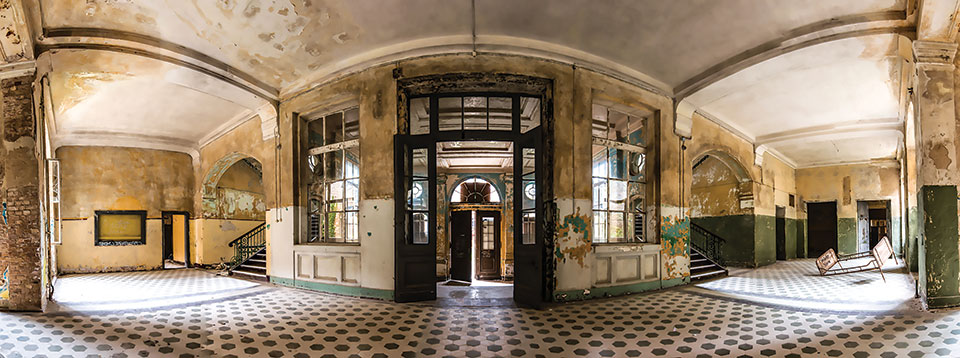We Were the New Era

In post-unification Berlin, groups of squatters compete for empty housing. Who will gain the upper hand?
The next morning, a group of angry men were standing in the yard. They had brought crowbars and other tools with them. A large black Doberman was running around the leader, who called himself Thomas. Behind him were four others, including a beast of a guy in tartan trousers with a falsetto voice, whose name we later discovered was Georg. The other three were rather small like Thomas but looked pretty mean in their cloth trousers and fake leather jackets that they had clearly acquired at a five-finger discount. Only when Thomas saw that he and his gang were outnumbered did he relax slightly, put down his crowbar, and start talking.
He said that they’d seen the house first and it was a bloody cheek that we had just gone in without asking. He claimed the whole property for himself. Nele stood up to him: “Tough luck! So when do you claim to have seen the house and why didn’t you stay here straight away? We’ve been here since yesterday, replaced the locks and informed the municipal authority, so now it’s ours. That’s the rules.”
“’Cause I had stuff to do down at Zoo station, and my dog was still staying with a friend.” However, he added that he’d been here three days ago and what’s more important, on the same night he’d informed the Plenary Assembly of the Houses of Berlin, which met daily in the Mainzer Straße and announced the ever-increasing record number of occupied houses. At the meeting he had made it known that he, Thomas, and the guys from around the Memorial Church had occupied the building at No. 5 Badstübner Straße. And by the way, if we wanted, he could drum up a load more skaters from around the fountain on Breit-scheidplatz, who would come back and explain it to us in a language we would all understand. As he spoke, he picked up the crowbar again.
The house’s only occupants were a couple of illicit East German tenants who didn’t take squatting particularly seriously but primarily wanted to establish some weird cinema on the ground floor.
Then Rachel pushed herself forward and told our version of events and insisted on the validity of the locks and the officiality of our actions. She apologized as nicely as she could for the clear misunderstanding. “If we had known that this property already belonged to another group, we would have picked another one,” she said, adding that there were so many in the vicinity that may be even more attractive. As Thomas and his gang knew, she was talking about the partially occupied large detached town house in Berg Straße: fourteen-foot ceilings, floors bathed in sunlight and located opposite a lovely old cemetery, backing on to Nordbahnhof station, which was being rebuilt. From there, it would only be twenty minutes to Zoo station. And then there was also a practically empty rear house in Veteranen Straße with no front house but an awesome view of the park. Its only occupants were a couple of illicit East German tenants who didn’t take squatting particularly seriously but primarily wanted to establish some weird cinema on the ground floor. However, only a large white bed sheet had been nailed to one of the walls to function as the screen. “Stunning properties, all still vacant and just the right size for a small group like you. We may have even considered one of these gems for ourselves, but the matter’s official now and one of us, Johnny, has already signed for it, with his real name!” she finished.
At that, Thomas, Georg, and the other three crowded together and deliberated in whispers while the big dog growled and watched us as if he were looking at the devil incarnate. Evidently, Rachel’s estate-agent pitch had impressed a couple of the lads, who asked, Why waste more time here and risk getting into a fight when there are still much better and totally different options? It was Georg, in particular, who reasoned with Thomas, but he wasn’t to be convinced, and after a brief wrangle with the others, he asked us, “Anyway, how do you know how many of us there are? There’s a load of people around Zoo who’d be glad of such a large property.” Then he announced that more of them would come back tomorrow, including a few that weren’t as obliging as himself, and that we’d be better off finding something else in the meantime. “There are more than enough houses. So you don’t need to live in this exact one.”
As Georg touched his arm in an attempt to soothe him, he pulled himself free and yelled, “They’re just students! They can’t do anything,” and walked off with his dog and his pack in tow.
In the afternoon, we started picking our rooms. I chose one of the nicest: large and light, on the third floor facing south looking over the middle house. The others put out deck chairs on the tarmacked yard, and Johnny had brought some more tools, electrical cables, lightbulbs, a pot of coffee, and a thick-plaited yeast loaf from the baker across the road.
That evening we—that is Wenzel and I, Nele, and Johnny—drove Nele’s white Polo down Frankfurter Allee, very slowly so we could read all the street signs. We knew we were looking for one of the intersecting streets, but not which one. At Frankfurter Allee station we turned back. It was common knowledge that behind the station lay some kind of Plattenbau hell in the form of Hellersdorf and Hohenschönhausen, neighborhoods that we weren’t familiar with and whose names were only uttered with horror. The occupied houses of Friedrichshain acted as a front against this suburban evil.
When we finally found the street, we were surprised at how small it was. Compared to all the visitors’ tales and the articles in Der Spiegel magazine, which described a true empire of squatters, the houses appeared rather narrow and unthreatening to us.
A full street had been occupied, a total of nine houses. After asking around, we discovered that the Plenary Assembly sat around the clock at No. 6 Mainzer Straße. We parked the car and went up the stairs to the second floor where a huge room spanning the whole floor had been created by knocking out all the interior walls. A black octopus-like chandelier with candles hovered under the ceiling. Long benches with orange and brown synthetic padding, which looked as if they’d once belonged to some congress center or other, were pushed to the side. A blackboard was hung on the wall and information was scribbled on it: who was traveling when to Freiburg and how many places there were left in the bus, donations of mattresses were requested for a newly occupied house in Scharnweber Straße, sightings of neo-Nazis in the past few days, ticket controls on underground routes in the West, and so on. A group dressed in short trousers and scuffed work shoes was sitting in one corner. People eyed us up and looked at us as if we had strayed in there by accident, then we realized that in our jeans, T-shirts, and sneakers we didn’t look like your archetypal squatters. Back in the day, I didn’t even have an earring, and although Nele had dyed her hair red, the color didn’t look at all unnatural. Johnny’s hair should have been cut months ago. The way he neglected himself was similar to that of an absent-minded professor, and this impression was only reinforced by his dirty loafers. Back then, Wenzel looked more or less the same as he does now, like a professor’s assistant with almost no hair and round metal-rimmed glasses.
“What do you want, then?” one of the women in the room asked. On the top of her head sat an impressive tower of dreadlocks with colored beads woven into it.
Nele cleared her throat and began. “Yesterday, we, the Collective for Renewal, occupied two rear houses and the wing of No. 5 Badstübner Straße in the district of Berlin-Mitte. We are hoping for your support and the warm solidarity of the squatters of Friedrichshain. Better to squat than to let homes rot!” As she invoked the battle cry she raised her fist, which looked somewhat forced.
“But one of you was already here,” the dreadlocks said calmly. She went to the open window and shouted down to the street, “Hey you! Yes, you! Come back up! Your gang’s here!”
When Thomas reached the door, he flew into a rage. His dog barked dutifully, and Georg, who was standing behind him, tried to calm him down, but Thomas was yelling as loudly as he could. A vein on his temple appeared and started throbbing. “You pigs!” he yelled. “I saw it first! Find your own house! Piss off!”
His tirade of insults became increasingly incomprehensible, and the dog’s barking drowned some of it out. But afterward, Wenzel and I swore on our lives that he had called us “a couple of queer wankers” and that we should be put against a wall. Admittedly, Johnny and Nele were skeptical: they didn’t think that he could be that stupid, as such insults would mean immediate exclusion from the East Berlin squatter scene. Only later, when the story ended so sadly, did everyone, including those who weren’t even present, reaffirm that back then at the Plenary Assembly at No. 6 Mainzer Straße Thomas had threatened to kill us, some even said he threatened to gas us, and that he had hurled all kinds of homophobic and misogynistic insults.
Only later, when the story ended so sadly, did everyone, including those who weren’t even present, reaffirm that back then at the Plenary Assembly at No. 6 Mainzer Straße Thomas had threatened to kill us, some even said he threatened to gas us, and that he had hurled all kinds of homophobic and misogynistic insults.
His yelling attracted a whole crowd of onlookers, and after a few minutes, the plenum was in session with over twenty members. Thomas calmed down and breathed more slowly; Georg rubbed his neck with his massive paw while his other hand held the dog’s mouth shut. We were now sitting on wooden chairs around the big blackboard, and the only thing that calmed me was that Thomas and Georg, in their badly fitting designer jeans and ridiculous leather slippers (unwittingly financed by large department stores), looked even more out of place than we did.
Thomas appeared to suspect that after his raging a further defeat was awaiting him, but he wasn’t going to give up without a fight. He pulled himself together while Georg massaged his back and Thomas told the story as it was from his point of view.
Months ago, he explained, he had got together a group of youths from around the Memorial Church, who skateboarded on the World Fountain and tapped tourists for money there. Very few of them had a real home, and they were prepared to go east with him. Pickings from begging were slim in the mornings, so they’d taken the train to Friedrichstraße, crossed the border next to the Palace of Tears, and searched the whole quarter for a home. Until one day, when they were just about to give up and return to their shelter in West Berlin with their heads hanging, they were finally saved. That day was one afternoon last week when they saw a courtyard that they had often just walked past without paying it any attention. A paradise of empty houses opened up in front of them. Even the first, somewhat musty left wing opposite the empty cinema would be perfect. As if that was not enough, just behind it the middle house arose, dark and secretive, immediately giving way to a second courtyard where several wings were free, and in addition there was the half-dilapidated shed and the factory with the red roof tiles at the end of the courtyard. They had all fallen into each other’s arms, laughed, cried, and danced. Finally, a home for the lost souls of Zoo station. Thomas would have long since led them to their new home if it hadn’t been for these underhanded students, who had secretly, indeed deceitfully, taken the plot for themselves, dutifully registered it with the local authorities, and probably even told the cops.
“But why didn’t you just go in, change the locks, and be done with it?” asked Dreadlocks while another Mainzer Straße freak in shorts, sturdy work boots, long greasy hair, and glasses nodded.
Thomas came over all nervous—he clearly struggled to find his words—and fidgeted in his chair again. We secretly hoped that he was going to go into another rage, but Georg prevented that by getting up. “We had to go back to Zoo and earn some dough. ’Coz we don’t have any parents to send us money every month.”
Now, there was even applause from the ranks of the squatters. One-nil to the skaters! Thomas also pulled himself together and whined that he was just looking for somewhere for him and his girlfriend, for the dog, and maybe at some point also a child. He no longer wanted to be forced to sleep on ventilation shafts and in underground stations where your shoes got nicked. That last bit wasn’t so clever, as now all the assembled committee were staring at Thomas’s shoes, which actually looked rather expensive. It was obvious that no one need worry about the supply of designer clothes for him and his gang, but that was no longer important as the mood had changed and, for the time being, was in his favor.
“Do you actually know what they live off down there at Zoo station?” asked Wenzel, visibly panicked. And that was even less clever because now the freak with the long, greasy hair rose and said in a calm, clear voice, “Yes, it may well be that Thomas and his friends at Zoo station are sometimes forced to steal, push some grass, or do whatever else it is to get some dough! And nevertheless, or maybe precisely for that reason, I plead for them to move into the property at No. 5 Badstübner Straße! It’s the circumstances that are criminal, not the people that have to live in them!”
The Plenary Assembly cheered and the squatters stamped their feet on the old wooden floorboards. Things were going badly for us and the freak hadn’t even finished.
“However, these students here.” He pointed at us as he spoke. “They already have everything they need. They should do political work in the neighborhoods where their parents have rented flats for them. Or should we allow them to play at squatting and revolution before they finish their studies and settle down somewhere in luxury as doctors and lawyers, undoubtedly sending the rents soaring? No, the skaters from Zoo have a right to the Badstübner property! Better to squat than to let homes rot!”
Amid thundering applause, Thomas and Georg threw their arms in the air while the dog sprang up on the cheering crowd and would have seriously injured a couple of them if Georg hadn’t forced him back to the floor and used his hand as a muzzle.
Then Nele stood up. The room was even fuller, and there were now between forty or fifty listeners sitting on the chairs. I’d already seen Nele defend hopeless positions in front of large groups before, such as during the long student strike of ’88 and in the weekly meetings of the West autonomists in an old factory yard on Mehringdamm, and each time she succeeded in turning the mood in her favor. This time she appeared more nervous than usual, and I’m sure that the moment she started speaking she didn’t have the faintest idea how it would all end for us. She probably didn’t even know how the sentence was to going to end that she was just beginning.
“Yes, you’ve hit the nail on the head, you’re right, many of us have grown up with privileges and come from West Germany and from families without any real problems,” and at that she raised her voice higher to make it clear that she wasn’t finished yet. By now, most of the squatters were hanging on her every word. I never understood how she did that. I haven’t yet managed to just get up and say who I am and what I want. Nele, however, was born with this gift. “And we are prepared,” she said, “to give the whole property over to the skaters, who have a completely different background from us and who have to earn their living by fighting, dealing, and providing other ‘small services’ at Zoo station.” Nele then leisurely walked forward, used her sweatshirt sleeve to wipe the blackboard clean, and in silence she slowly drew a chalk plan of the buildings in the Badstübner Straße on the greeny-black surface. She sketched the entry to the street, the cinema, the first side wing, the middle house, the second courtyard with the many subwings and rear houses with the factory building and the shed, even the old dilapidated garages on the north side. “The full building, the side wings, the rear house, the middle house, the cinema, and the front house. Room for seventy to ninety squatters!”
She dropped the chalk onto the ledge under the blackboard. Satisfied, she looked around. “We could also establish our small cultural project elsewhere with the planned point of contact for abused fascist kids, for the fourteen- to sixteen-year-old street kids, who are treated like slaves in the houses of the neo-Nazis. We’ll find something.”
A split second of fear passed before the Mainzer Straße squatters understood what Nele had just shown them. With the approval of the Mainzer Straße a massive property full of petty criminals would spring up: pickpockets, shoplifters, car thieves, grass dealers, and rent boys, all behind their backs, and they couldn’t control it themselves.
“How many of you are there, then?” the freak suddenly asked Thomas and Georg.
“The cops would never allow it,” said someone at the back, and the others nodded.
“They’re infiltrating us, they have absolutely no political conscience, someone needs to keep an eye on them. Twenty of them okay, but seventy . . .”
Thomas looked on as the victory he thought was his slipped through his grasp. He was just about to flip out again, but Georg prevented it by standing up and yelling, “Hey, there aren’t so many of us, six, seven, at most ten. The others want to stay where they are, I promise. There’s nothing at all here in the East to nick. Here you’d rather give them some of your dough than a good hiding, that’s how pathetic they look.”
A few squatters laughed at Georg’s astute but not-exactly politically correct point. Now he had their attention, but also some of the humorless squatters against him. They muttered that he thought himself a cut above and whether we, with our laughable room allocation dispute, even knew what real problems were?
Georg allowed himself one more argument. “All I need is a room so I can work in peace and maybe another one for socializing, and Thomas here, he also just needs one room for himself, his dog, and his girlfriend, and his child.”
Now, Dreadlocks got up and went over to the blackboard. She picked up a piece of chalk and drew a line straight through Nele’s sketch, just above the middle house and diagonally over the courtyard and the shed. “There!” she exclaimed, “that’s how it’s gonna be!”
She had divided No. 5 Badstübner Straße. The lower half with the middle house, the cinema, and the unimportant side wings of the first courtyard were to go to Thomas and the skaters. The rest, everything above the second passage, was for us. The Plenary Assembly stared mesmerized at the sketch. Dreadlocks, who was now standing there serenely and gazing into space, radiated an almost majestic decisiveness. Everyone agreed immediately and started to talk about other things. At the end of the day, there were more important matters. Only Thomas was still protesting and squawked loudly at the committee. “No, I saw it first. I don’t want to move into the middle house! It stinks!”
Since hysterical disorder was breaking out again and Thomas kept jumping up unable to be calmed by even Georg’s soft grip, the long-haired squatter chieftain, who had been proudly sitting like an emperor next to Dreadlocks, addressed everyone, and as he did, he gave Thomas a dark look. It was clear that he was serious and that he wasn’t going to repeat it. “The Plenary Assembly of the Houses of Berlin has sat and in my opinion has reached a wise decision. We, who occupied Mainzer Straße a long time ago, we know what abandoned houses smell like! And we’re not too fine to work to make them habitable, defendable, and nice! And you will also do the same. I have no doubt of that. Stop crying and work! Better to squat than to let homes rot!”
The crowd applauded and Nele nudged us. We’d got what we could out of it. It was time to go.
Translation from the German
By Catherine Venner












